Organisational Behaviour Report: A David & Co. Analysis
VerifiedAdded on 2021/01/03
|14
|3390
|223
Report
AI Summary
This report provides an in-depth analysis of organisational behaviour, focusing on A David & Co. The report covers the influence of culture, power, and politics within the organization, examining how these factors impact employee behaviour and overall performance. It delves into Handy's organizational culture theory, French & Raven's power theory, and Chanlat's theory of political behaviour to understand the dynamics at play. The report also explores motivational theories, including content and process theories, such as Maslow's hierarchy of needs and Vroom's expectancy theory, to understand how A David & Co. can motivate its employees. Finally, the report differentiates between effective and ineffective teams, highlighting the characteristics and impact of each type, with a focus on the team dynamics within A David & Co. The report concludes with a discussion on the importance of understanding and managing organisational behaviour to achieve organizational goals.
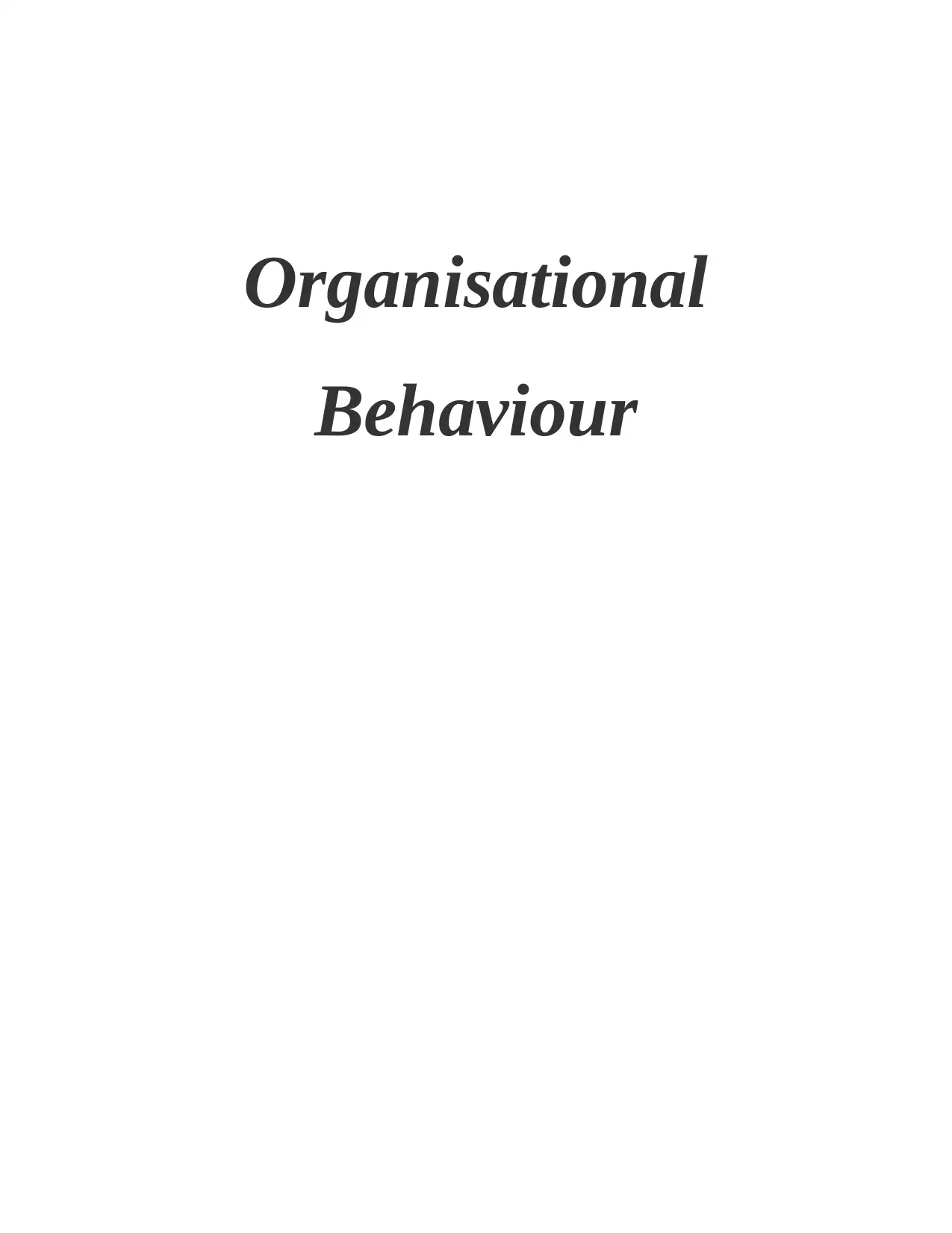
Organisational
Behaviour
Behaviour
Paraphrase This Document
Need a fresh take? Get an instant paraphrase of this document with our AI Paraphraser
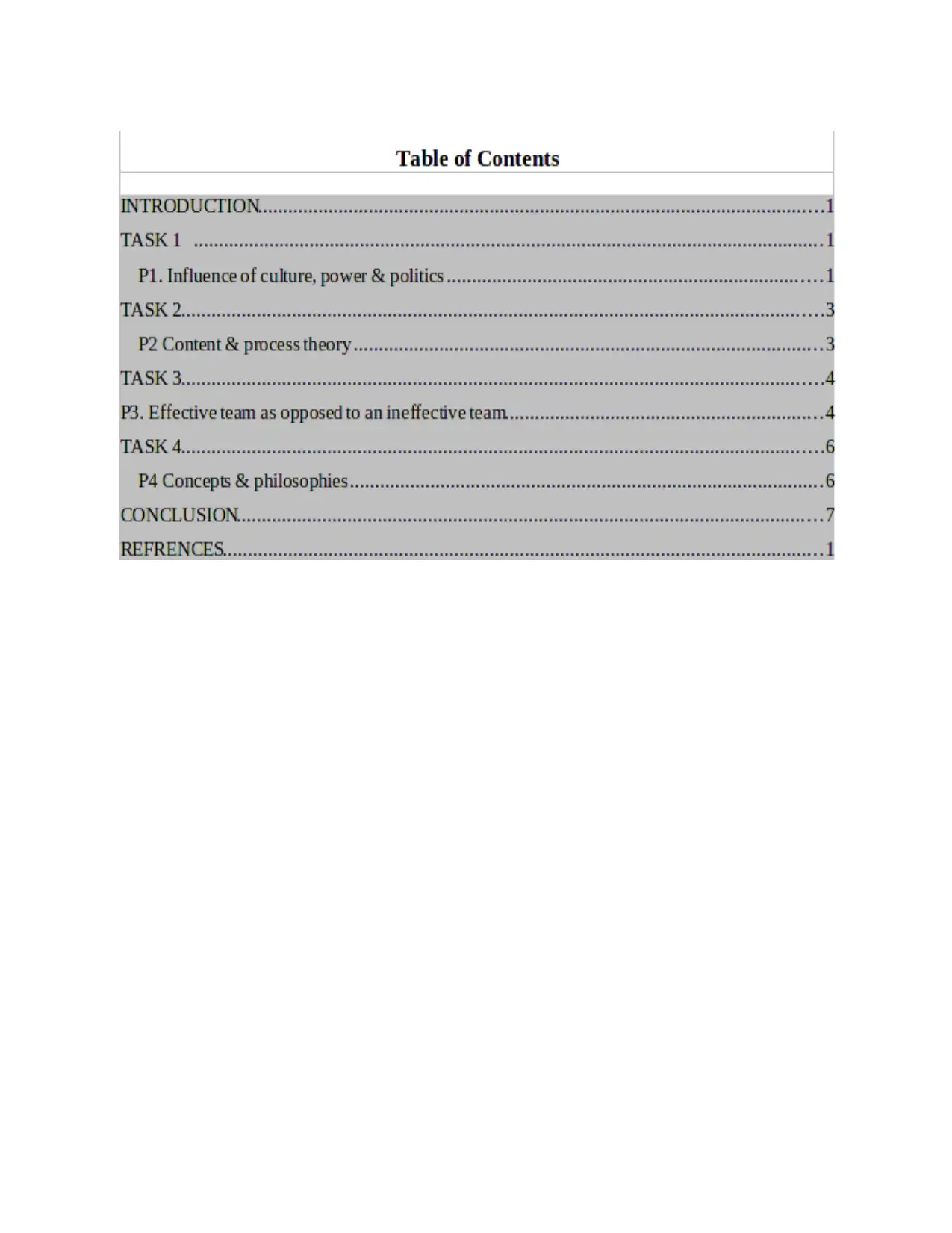
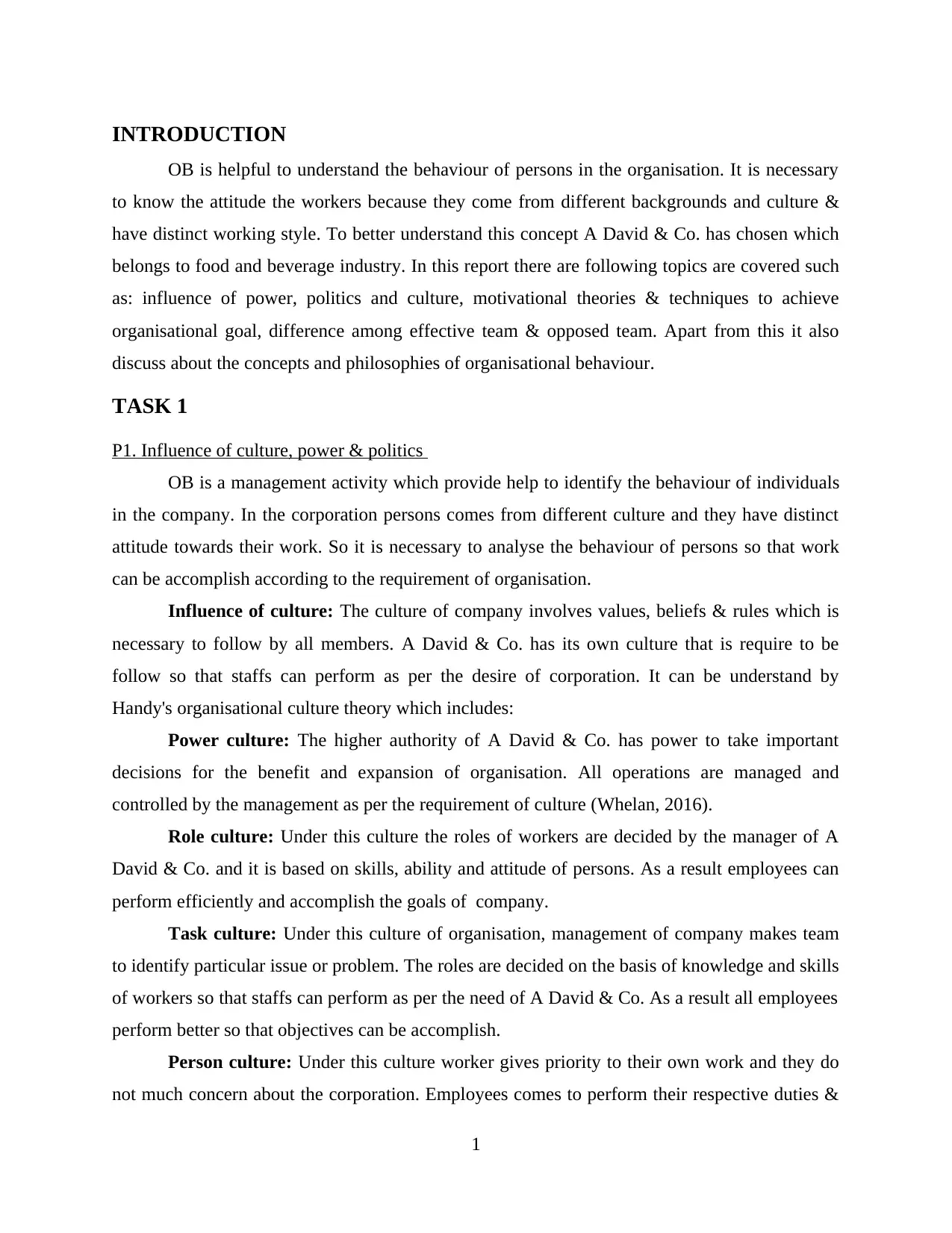
INTRODUCTION
OB is helpful to understand the behaviour of persons in the organisation. It is necessary
to know the attitude the workers because they come from different backgrounds and culture &
have distinct working style. To better understand this concept A David & Co. has chosen which
belongs to food and beverage industry. In this report there are following topics are covered such
as: influence of power, politics and culture, motivational theories & techniques to achieve
organisational goal, difference among effective team & opposed team. Apart from this it also
discuss about the concepts and philosophies of organisational behaviour.
TASK 1
P1. Influence of culture, power & politics
OB is a management activity which provide help to identify the behaviour of individuals
in the company. In the corporation persons comes from different culture and they have distinct
attitude towards their work. So it is necessary to analyse the behaviour of persons so that work
can be accomplish according to the requirement of organisation.
Influence of culture: The culture of company involves values, beliefs & rules which is
necessary to follow by all members. A David & Co. has its own culture that is require to be
follow so that staffs can perform as per the desire of corporation. It can be understand by
Handy's organisational culture theory which includes:
Power culture: The higher authority of A David & Co. has power to take important
decisions for the benefit and expansion of organisation. All operations are managed and
controlled by the management as per the requirement of culture (Whelan, 2016).
Role culture: Under this culture the roles of workers are decided by the manager of A
David & Co. and it is based on skills, ability and attitude of persons. As a result employees can
perform efficiently and accomplish the goals of company.
Task culture: Under this culture of organisation, management of company makes team
to identify particular issue or problem. The roles are decided on the basis of knowledge and skills
of workers so that staffs can perform as per the need of A David & Co. As a result all employees
perform better so that objectives can be accomplish.
Person culture: Under this culture worker gives priority to their own work and they do
not much concern about the corporation. Employees comes to perform their respective duties &
1
OB is helpful to understand the behaviour of persons in the organisation. It is necessary
to know the attitude the workers because they come from different backgrounds and culture &
have distinct working style. To better understand this concept A David & Co. has chosen which
belongs to food and beverage industry. In this report there are following topics are covered such
as: influence of power, politics and culture, motivational theories & techniques to achieve
organisational goal, difference among effective team & opposed team. Apart from this it also
discuss about the concepts and philosophies of organisational behaviour.
TASK 1
P1. Influence of culture, power & politics
OB is a management activity which provide help to identify the behaviour of individuals
in the company. In the corporation persons comes from different culture and they have distinct
attitude towards their work. So it is necessary to analyse the behaviour of persons so that work
can be accomplish according to the requirement of organisation.
Influence of culture: The culture of company involves values, beliefs & rules which is
necessary to follow by all members. A David & Co. has its own culture that is require to be
follow so that staffs can perform as per the desire of corporation. It can be understand by
Handy's organisational culture theory which includes:
Power culture: The higher authority of A David & Co. has power to take important
decisions for the benefit and expansion of organisation. All operations are managed and
controlled by the management as per the requirement of culture (Whelan, 2016).
Role culture: Under this culture the roles of workers are decided by the manager of A
David & Co. and it is based on skills, ability and attitude of persons. As a result employees can
perform efficiently and accomplish the goals of company.
Task culture: Under this culture of organisation, management of company makes team
to identify particular issue or problem. The roles are decided on the basis of knowledge and skills
of workers so that staffs can perform as per the need of A David & Co. As a result all employees
perform better so that objectives can be accomplish.
Person culture: Under this culture worker gives priority to their own work and they do
not much concern about the corporation. Employees comes to perform their respective duties &
1
⊘ This is a preview!⊘
Do you want full access?
Subscribe today to unlock all pages.

Trusted by 1+ million students worldwide
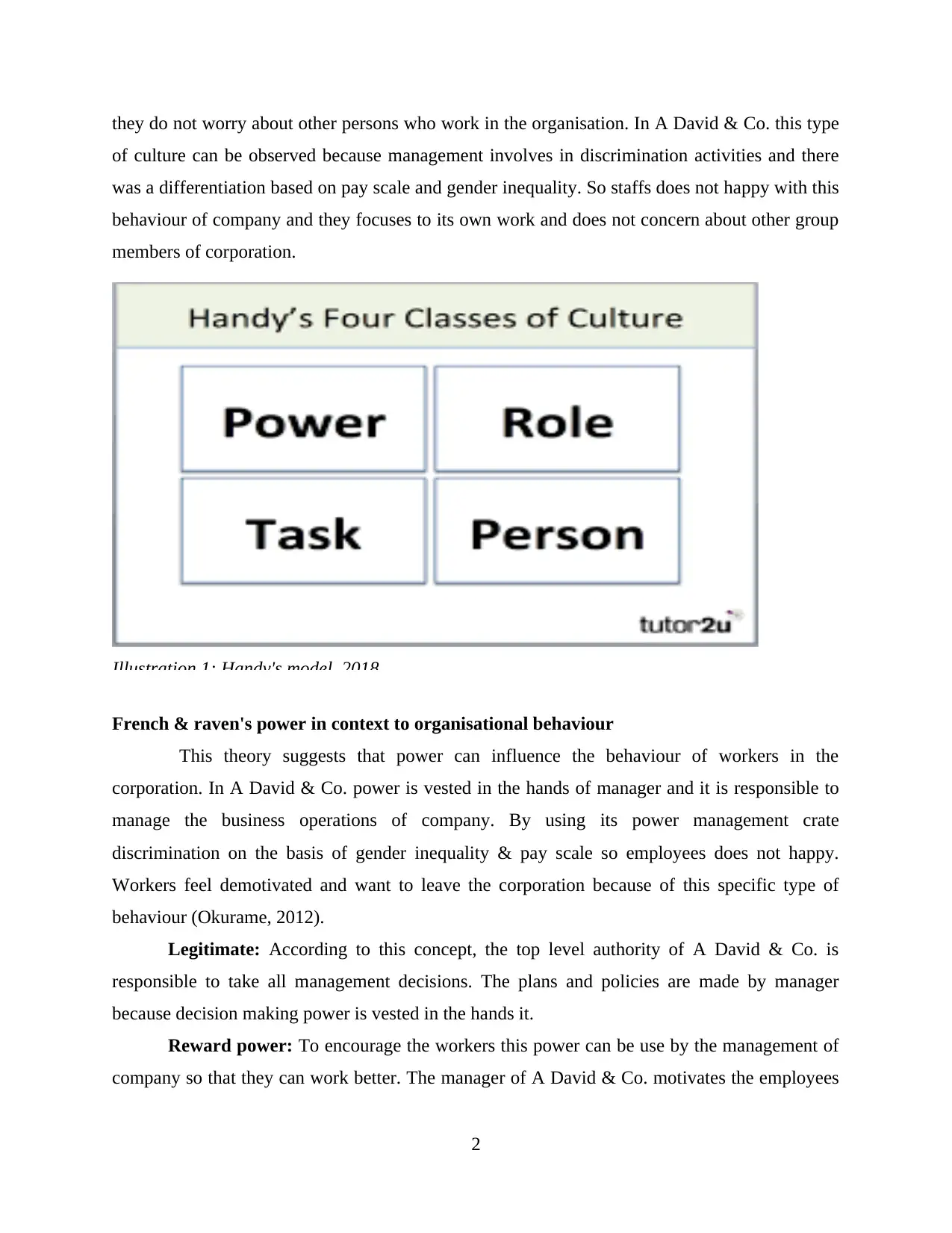
they do not worry about other persons who work in the organisation. In A David & Co. this type
of culture can be observed because management involves in discrimination activities and there
was a differentiation based on pay scale and gender inequality. So staffs does not happy with this
behaviour of company and they focuses to its own work and does not concern about other group
members of corporation.
Illustration 1: Handy's model. 2018
French & raven's power in context to organisational behaviour
This theory suggests that power can influence the behaviour of workers in the
corporation. In A David & Co. power is vested in the hands of manager and it is responsible to
manage the business operations of company. By using its power management crate
discrimination on the basis of gender inequality & pay scale so employees does not happy.
Workers feel demotivated and want to leave the corporation because of this specific type of
behaviour (Okurame, 2012).
Legitimate: According to this concept, the top level authority of A David & Co. is
responsible to take all management decisions. The plans and policies are made by manager
because decision making power is vested in the hands it.
Reward power: To encourage the workers this power can be use by the management of
company so that they can work better. The manager of A David & Co. motivates the employees
2
of culture can be observed because management involves in discrimination activities and there
was a differentiation based on pay scale and gender inequality. So staffs does not happy with this
behaviour of company and they focuses to its own work and does not concern about other group
members of corporation.
Illustration 1: Handy's model. 2018
French & raven's power in context to organisational behaviour
This theory suggests that power can influence the behaviour of workers in the
corporation. In A David & Co. power is vested in the hands of manager and it is responsible to
manage the business operations of company. By using its power management crate
discrimination on the basis of gender inequality & pay scale so employees does not happy.
Workers feel demotivated and want to leave the corporation because of this specific type of
behaviour (Okurame, 2012).
Legitimate: According to this concept, the top level authority of A David & Co. is
responsible to take all management decisions. The plans and policies are made by manager
because decision making power is vested in the hands it.
Reward power: To encourage the workers this power can be use by the management of
company so that they can work better. The manager of A David & Co. motivates the employees
2
Paraphrase This Document
Need a fresh take? Get an instant paraphrase of this document with our AI Paraphraser
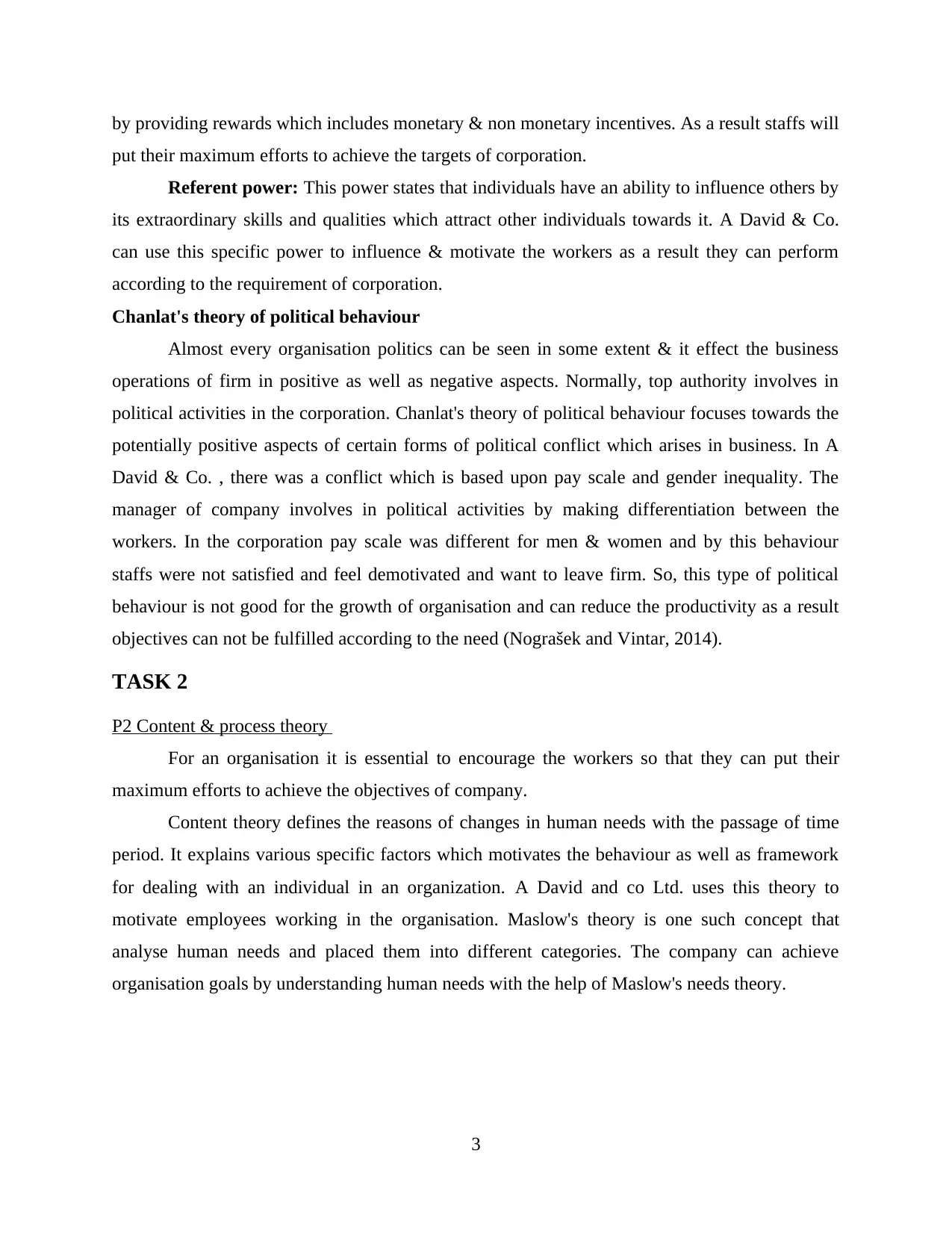
by providing rewards which includes monetary & non monetary incentives. As a result staffs will
put their maximum efforts to achieve the targets of corporation.
Referent power: This power states that individuals have an ability to influence others by
its extraordinary skills and qualities which attract other individuals towards it. A David & Co.
can use this specific power to influence & motivate the workers as a result they can perform
according to the requirement of corporation.
Chanlat's theory of political behaviour
Almost every organisation politics can be seen in some extent & it effect the business
operations of firm in positive as well as negative aspects. Normally, top authority involves in
political activities in the corporation. Chanlat's theory of political behaviour focuses towards the
potentially positive aspects of certain forms of political conflict which arises in business. In A
David & Co. , there was a conflict which is based upon pay scale and gender inequality. The
manager of company involves in political activities by making differentiation between the
workers. In the corporation pay scale was different for men & women and by this behaviour
staffs were not satisfied and feel demotivated and want to leave firm. So, this type of political
behaviour is not good for the growth of organisation and can reduce the productivity as a result
objectives can not be fulfilled according to the need (Nograšek and Vintar, 2014).
TASK 2
P2 Content & process theory
For an organisation it is essential to encourage the workers so that they can put their
maximum efforts to achieve the objectives of company.
Content theory defines the reasons of changes in human needs with the passage of time
period. It explains various specific factors which motivates the behaviour as well as framework
for dealing with an individual in an organization. A David and co Ltd. uses this theory to
motivate employees working in the organisation. Maslow's theory is one such concept that
analyse human needs and placed them into different categories. The company can achieve
organisation goals by understanding human needs with the help of Maslow's needs theory.
3
put their maximum efforts to achieve the targets of corporation.
Referent power: This power states that individuals have an ability to influence others by
its extraordinary skills and qualities which attract other individuals towards it. A David & Co.
can use this specific power to influence & motivate the workers as a result they can perform
according to the requirement of corporation.
Chanlat's theory of political behaviour
Almost every organisation politics can be seen in some extent & it effect the business
operations of firm in positive as well as negative aspects. Normally, top authority involves in
political activities in the corporation. Chanlat's theory of political behaviour focuses towards the
potentially positive aspects of certain forms of political conflict which arises in business. In A
David & Co. , there was a conflict which is based upon pay scale and gender inequality. The
manager of company involves in political activities by making differentiation between the
workers. In the corporation pay scale was different for men & women and by this behaviour
staffs were not satisfied and feel demotivated and want to leave firm. So, this type of political
behaviour is not good for the growth of organisation and can reduce the productivity as a result
objectives can not be fulfilled according to the need (Nograšek and Vintar, 2014).
TASK 2
P2 Content & process theory
For an organisation it is essential to encourage the workers so that they can put their
maximum efforts to achieve the objectives of company.
Content theory defines the reasons of changes in human needs with the passage of time
period. It explains various specific factors which motivates the behaviour as well as framework
for dealing with an individual in an organization. A David and co Ltd. uses this theory to
motivate employees working in the organisation. Maslow's theory is one such concept that
analyse human needs and placed them into different categories. The company can achieve
organisation goals by understanding human needs with the help of Maslow's needs theory.
3
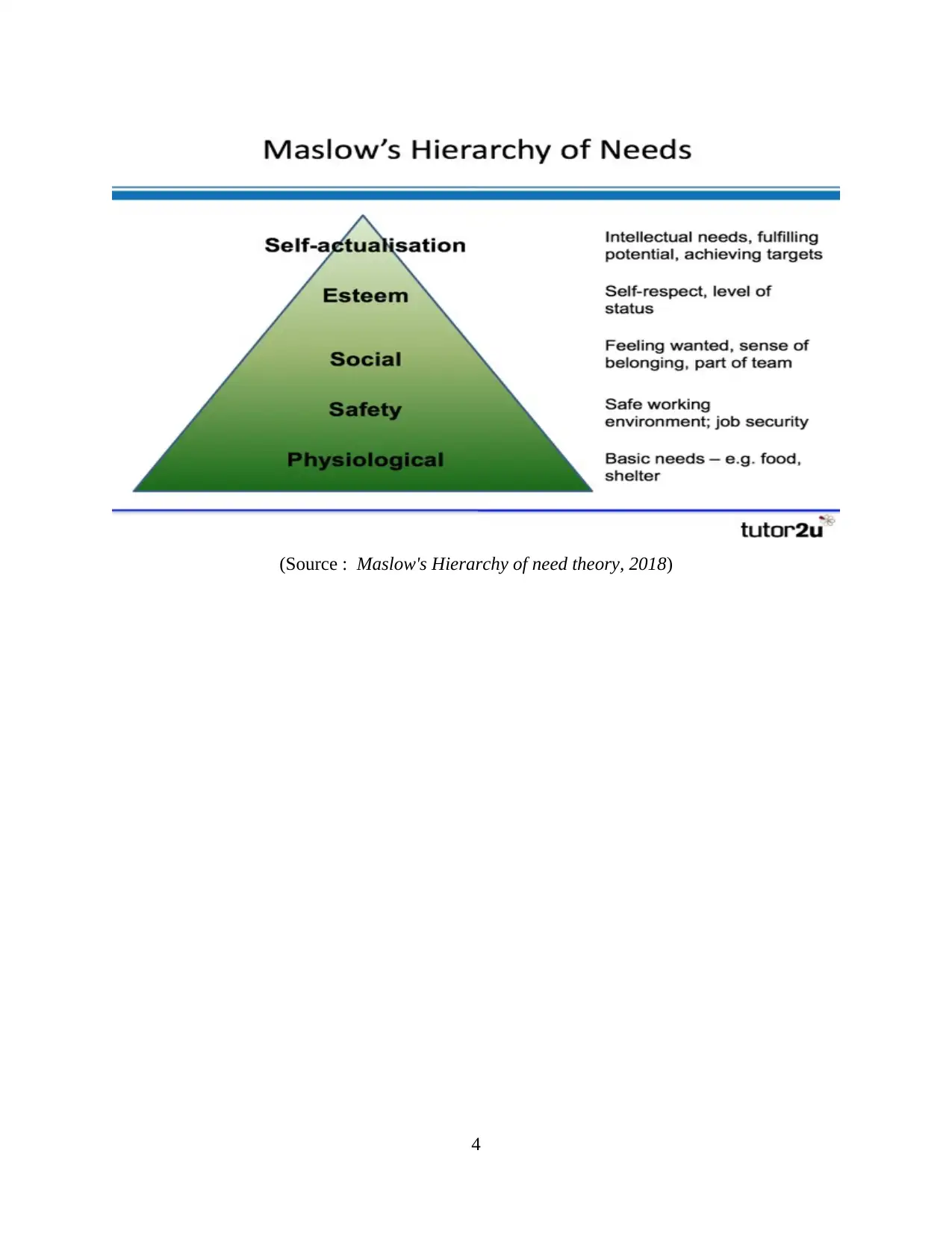
(Source : Maslow's Hierarchy of need theory, 2018)
4
4
⊘ This is a preview!⊘
Do you want full access?
Subscribe today to unlock all pages.

Trusted by 1+ million students worldwide
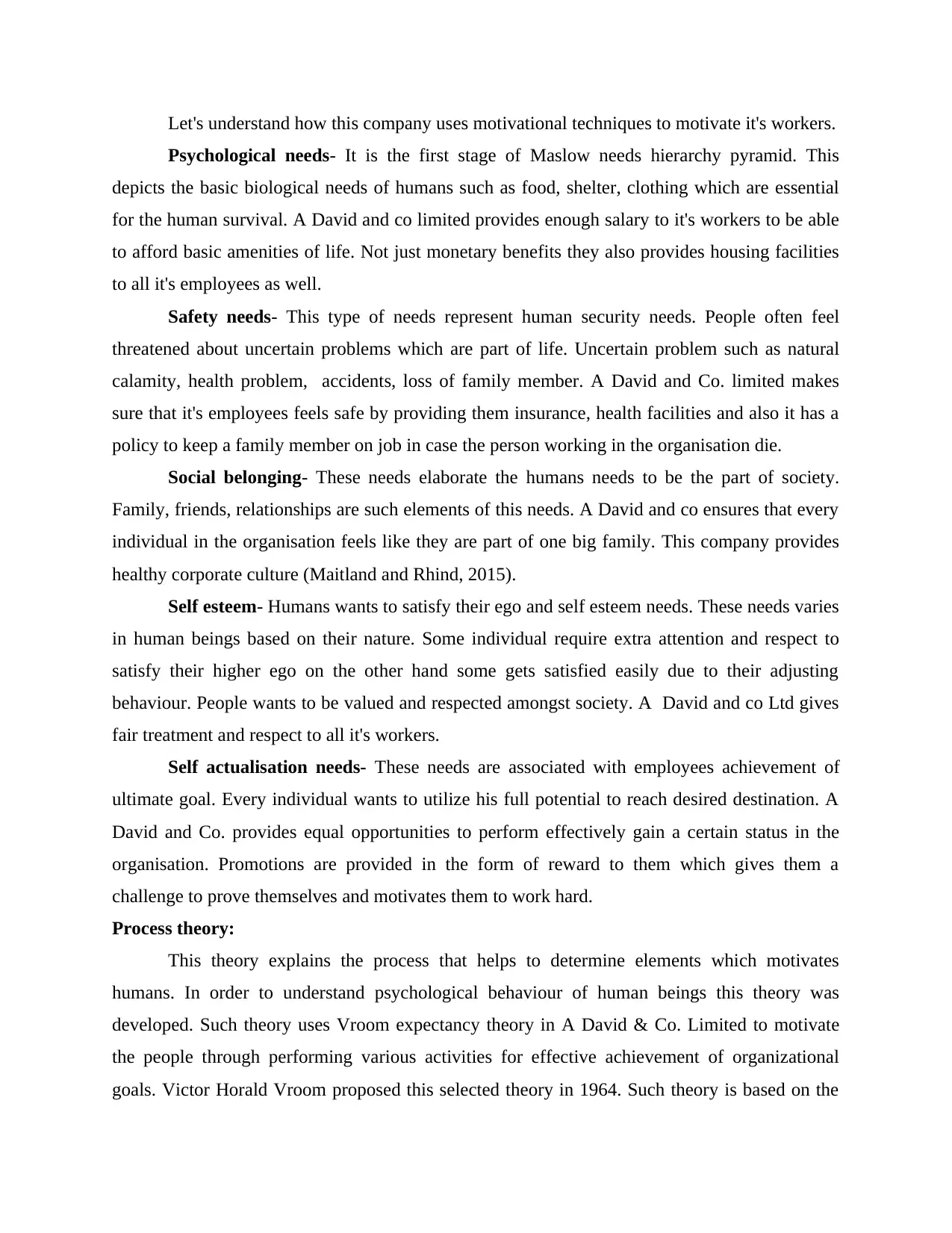
Let's understand how this company uses motivational techniques to motivate it's workers.
Psychological needs- It is the first stage of Maslow needs hierarchy pyramid. This
depicts the basic biological needs of humans such as food, shelter, clothing which are essential
for the human survival. A David and co limited provides enough salary to it's workers to be able
to afford basic amenities of life. Not just monetary benefits they also provides housing facilities
to all it's employees as well.
Safety needs- This type of needs represent human security needs. People often feel
threatened about uncertain problems which are part of life. Uncertain problem such as natural
calamity, health problem, accidents, loss of family member. A David and Co. limited makes
sure that it's employees feels safe by providing them insurance, health facilities and also it has a
policy to keep a family member on job in case the person working in the organisation die.
Social belonging- These needs elaborate the humans needs to be the part of society.
Family, friends, relationships are such elements of this needs. A David and co ensures that every
individual in the organisation feels like they are part of one big family. This company provides
healthy corporate culture (Maitland and Rhind, 2015).
Self esteem- Humans wants to satisfy their ego and self esteem needs. These needs varies
in human beings based on their nature. Some individual require extra attention and respect to
satisfy their higher ego on the other hand some gets satisfied easily due to their adjusting
behaviour. People wants to be valued and respected amongst society. A David and co Ltd gives
fair treatment and respect to all it's workers.
Self actualisation needs- These needs are associated with employees achievement of
ultimate goal. Every individual wants to utilize his full potential to reach desired destination. A
David and Co. provides equal opportunities to perform effectively gain a certain status in the
organisation. Promotions are provided in the form of reward to them which gives them a
challenge to prove themselves and motivates them to work hard.
Process theory:
This theory explains the process that helps to determine elements which motivates
humans. In order to understand psychological behaviour of human beings this theory was
developed. Such theory uses Vroom expectancy theory in A David & Co. Limited to motivate
the people through performing various activities for effective achievement of organizational
goals. Victor Horald Vroom proposed this selected theory in 1964. Such theory is based on the
Psychological needs- It is the first stage of Maslow needs hierarchy pyramid. This
depicts the basic biological needs of humans such as food, shelter, clothing which are essential
for the human survival. A David and co limited provides enough salary to it's workers to be able
to afford basic amenities of life. Not just monetary benefits they also provides housing facilities
to all it's employees as well.
Safety needs- This type of needs represent human security needs. People often feel
threatened about uncertain problems which are part of life. Uncertain problem such as natural
calamity, health problem, accidents, loss of family member. A David and Co. limited makes
sure that it's employees feels safe by providing them insurance, health facilities and also it has a
policy to keep a family member on job in case the person working in the organisation die.
Social belonging- These needs elaborate the humans needs to be the part of society.
Family, friends, relationships are such elements of this needs. A David and co ensures that every
individual in the organisation feels like they are part of one big family. This company provides
healthy corporate culture (Maitland and Rhind, 2015).
Self esteem- Humans wants to satisfy their ego and self esteem needs. These needs varies
in human beings based on their nature. Some individual require extra attention and respect to
satisfy their higher ego on the other hand some gets satisfied easily due to their adjusting
behaviour. People wants to be valued and respected amongst society. A David and co Ltd gives
fair treatment and respect to all it's workers.
Self actualisation needs- These needs are associated with employees achievement of
ultimate goal. Every individual wants to utilize his full potential to reach desired destination. A
David and Co. provides equal opportunities to perform effectively gain a certain status in the
organisation. Promotions are provided in the form of reward to them which gives them a
challenge to prove themselves and motivates them to work hard.
Process theory:
This theory explains the process that helps to determine elements which motivates
humans. In order to understand psychological behaviour of human beings this theory was
developed. Such theory uses Vroom expectancy theory in A David & Co. Limited to motivate
the people through performing various activities for effective achievement of organizational
goals. Victor Horald Vroom proposed this selected theory in 1964. Such theory is based on the
Paraphrase This Document
Need a fresh take? Get an instant paraphrase of this document with our AI Paraphraser
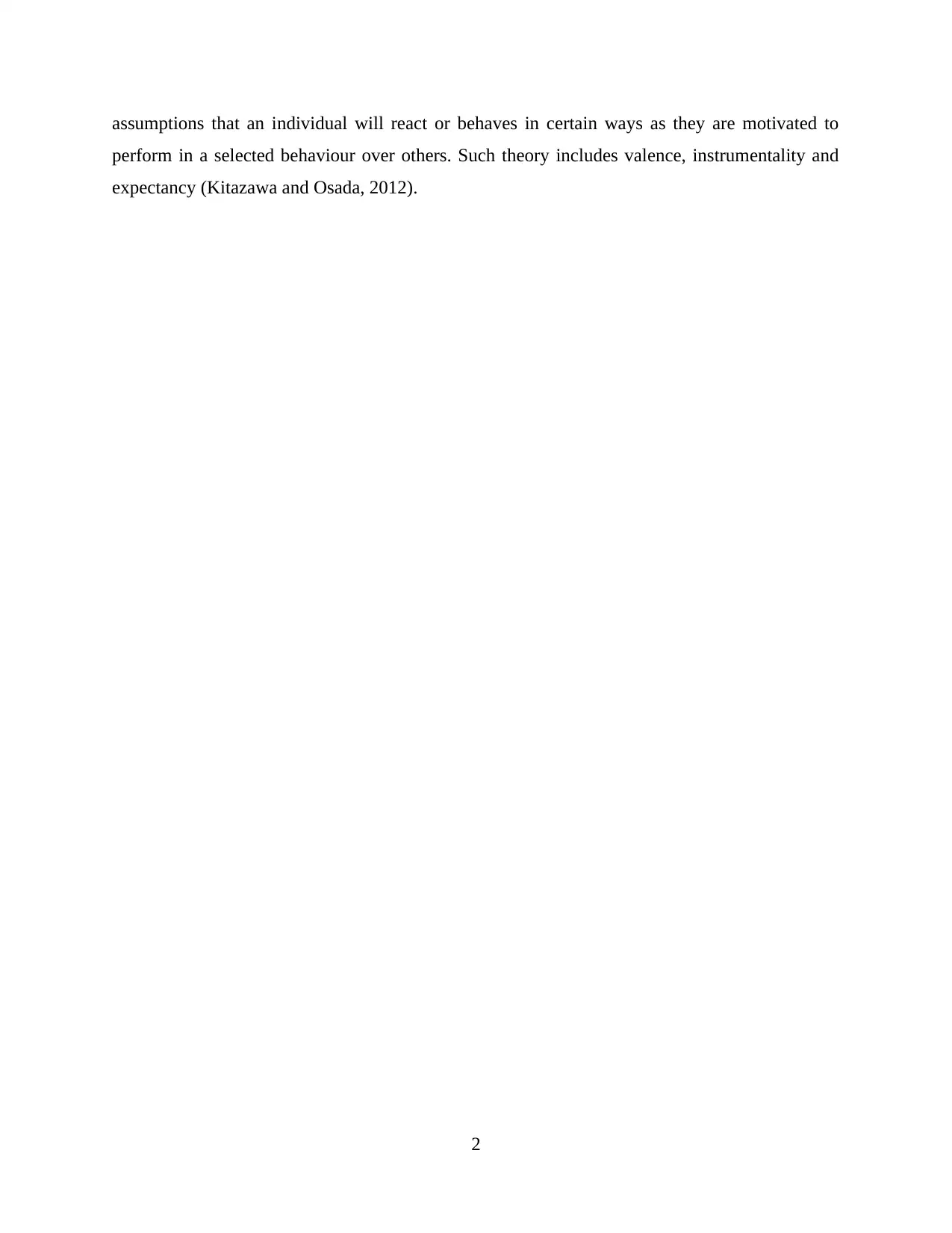
assumptions that an individual will react or behaves in certain ways as they are motivated to
perform in a selected behaviour over others. Such theory includes valence, instrumentality and
expectancy (Kitazawa and Osada, 2012).
2
perform in a selected behaviour over others. Such theory includes valence, instrumentality and
expectancy (Kitazawa and Osada, 2012).
2
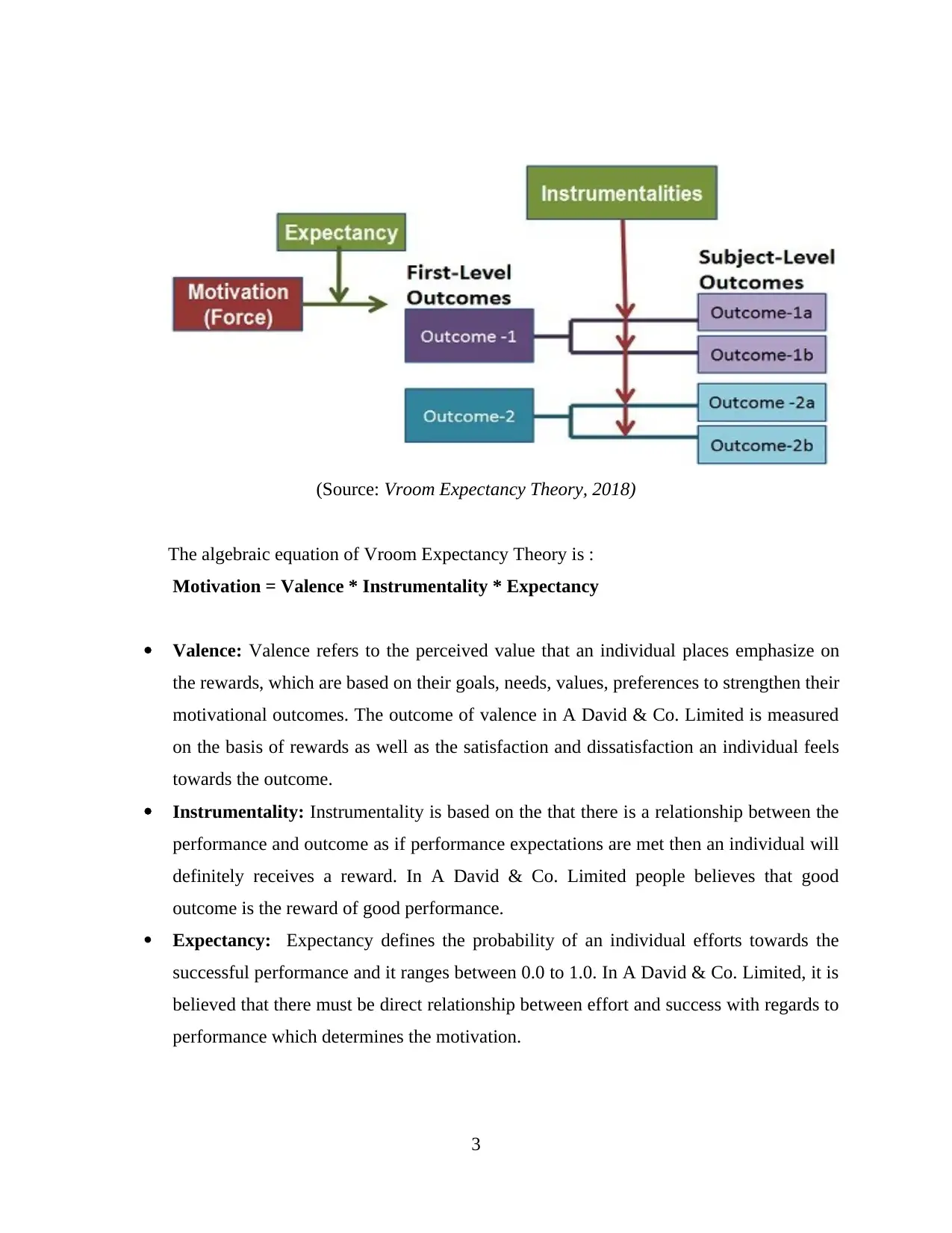
(Source: Vroom Expectancy Theory, 2018)
The algebraic equation of Vroom Expectancy Theory is :
Motivation = Valence * Instrumentality * Expectancy
Valence: Valence refers to the perceived value that an individual places emphasize on
the rewards, which are based on their goals, needs, values, preferences to strengthen their
motivational outcomes. The outcome of valence in A David & Co. Limited is measured
on the basis of rewards as well as the satisfaction and dissatisfaction an individual feels
towards the outcome.
Instrumentality: Instrumentality is based on the that there is a relationship between the
performance and outcome as if performance expectations are met then an individual will
definitely receives a reward. In A David & Co. Limited people believes that good
outcome is the reward of good performance.
Expectancy: Expectancy defines the probability of an individual efforts towards the
successful performance and it ranges between 0.0 to 1.0. In A David & Co. Limited, it is
believed that there must be direct relationship between effort and success with regards to
performance which determines the motivation.
3
The algebraic equation of Vroom Expectancy Theory is :
Motivation = Valence * Instrumentality * Expectancy
Valence: Valence refers to the perceived value that an individual places emphasize on
the rewards, which are based on their goals, needs, values, preferences to strengthen their
motivational outcomes. The outcome of valence in A David & Co. Limited is measured
on the basis of rewards as well as the satisfaction and dissatisfaction an individual feels
towards the outcome.
Instrumentality: Instrumentality is based on the that there is a relationship between the
performance and outcome as if performance expectations are met then an individual will
definitely receives a reward. In A David & Co. Limited people believes that good
outcome is the reward of good performance.
Expectancy: Expectancy defines the probability of an individual efforts towards the
successful performance and it ranges between 0.0 to 1.0. In A David & Co. Limited, it is
believed that there must be direct relationship between effort and success with regards to
performance which determines the motivation.
3
⊘ This is a preview!⊘
Do you want full access?
Subscribe today to unlock all pages.

Trusted by 1+ million students worldwide
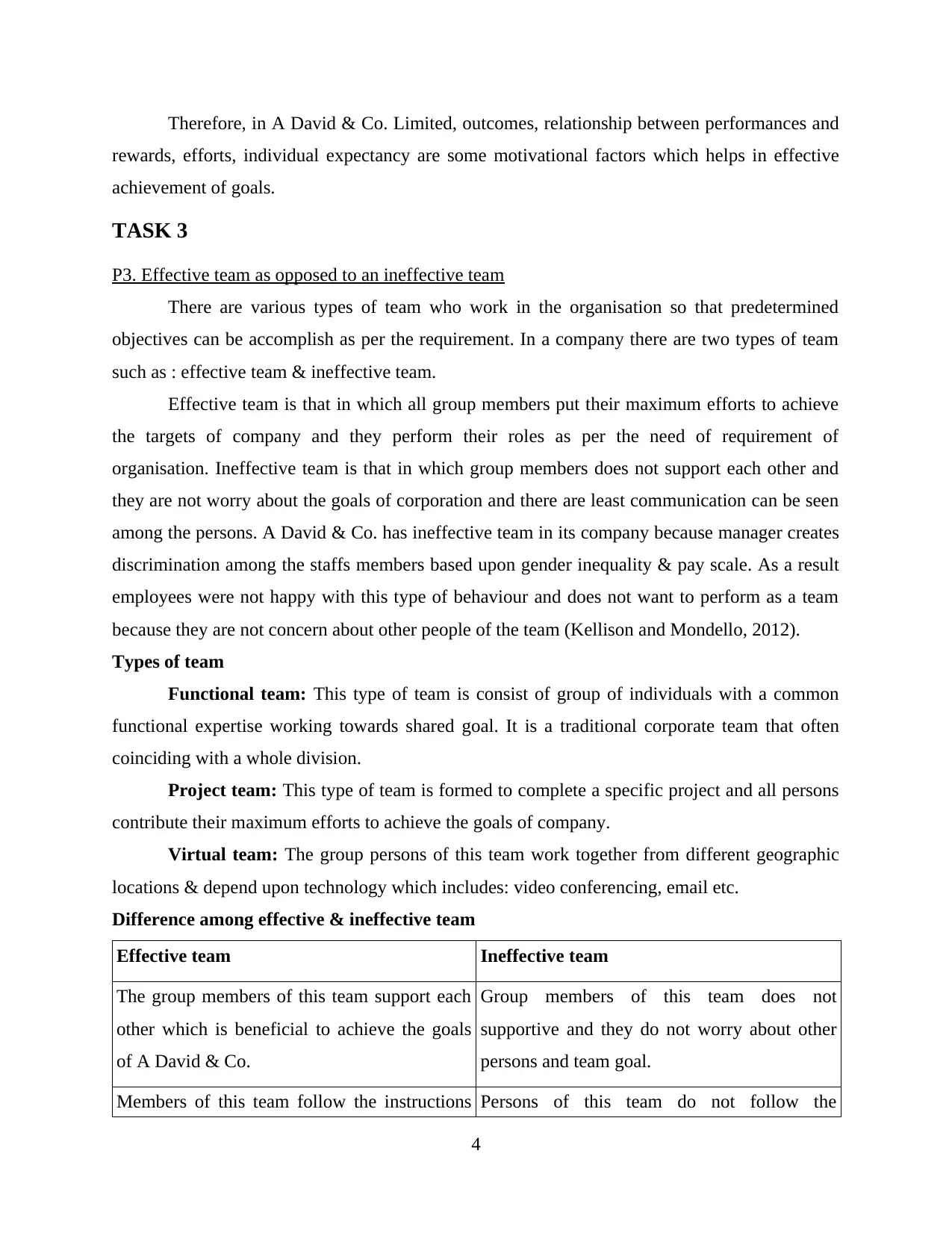
Therefore, in A David & Co. Limited, outcomes, relationship between performances and
rewards, efforts, individual expectancy are some motivational factors which helps in effective
achievement of goals.
TASK 3
P3. Effective team as opposed to an ineffective team
There are various types of team who work in the organisation so that predetermined
objectives can be accomplish as per the requirement. In a company there are two types of team
such as : effective team & ineffective team.
Effective team is that in which all group members put their maximum efforts to achieve
the targets of company and they perform their roles as per the need of requirement of
organisation. Ineffective team is that in which group members does not support each other and
they are not worry about the goals of corporation and there are least communication can be seen
among the persons. A David & Co. has ineffective team in its company because manager creates
discrimination among the staffs members based upon gender inequality & pay scale. As a result
employees were not happy with this type of behaviour and does not want to perform as a team
because they are not concern about other people of the team (Kellison and Mondello, 2012).
Types of team
Functional team: This type of team is consist of group of individuals with a common
functional expertise working towards shared goal. It is a traditional corporate team that often
coinciding with a whole division.
Project team: This type of team is formed to complete a specific project and all persons
contribute their maximum efforts to achieve the goals of company.
Virtual team: The group persons of this team work together from different geographic
locations & depend upon technology which includes: video conferencing, email etc.
Difference among effective & ineffective team
Effective team Ineffective team
The group members of this team support each
other which is beneficial to achieve the goals
of A David & Co.
Group members of this team does not
supportive and they do not worry about other
persons and team goal.
Members of this team follow the instructions Persons of this team do not follow the
4
rewards, efforts, individual expectancy are some motivational factors which helps in effective
achievement of goals.
TASK 3
P3. Effective team as opposed to an ineffective team
There are various types of team who work in the organisation so that predetermined
objectives can be accomplish as per the requirement. In a company there are two types of team
such as : effective team & ineffective team.
Effective team is that in which all group members put their maximum efforts to achieve
the targets of company and they perform their roles as per the need of requirement of
organisation. Ineffective team is that in which group members does not support each other and
they are not worry about the goals of corporation and there are least communication can be seen
among the persons. A David & Co. has ineffective team in its company because manager creates
discrimination among the staffs members based upon gender inequality & pay scale. As a result
employees were not happy with this type of behaviour and does not want to perform as a team
because they are not concern about other people of the team (Kellison and Mondello, 2012).
Types of team
Functional team: This type of team is consist of group of individuals with a common
functional expertise working towards shared goal. It is a traditional corporate team that often
coinciding with a whole division.
Project team: This type of team is formed to complete a specific project and all persons
contribute their maximum efforts to achieve the goals of company.
Virtual team: The group persons of this team work together from different geographic
locations & depend upon technology which includes: video conferencing, email etc.
Difference among effective & ineffective team
Effective team Ineffective team
The group members of this team support each
other which is beneficial to achieve the goals
of A David & Co.
Group members of this team does not
supportive and they do not worry about other
persons and team goal.
Members of this team follow the instructions Persons of this team do not follow the
4
Paraphrase This Document
Need a fresh take? Get an instant paraphrase of this document with our AI Paraphraser
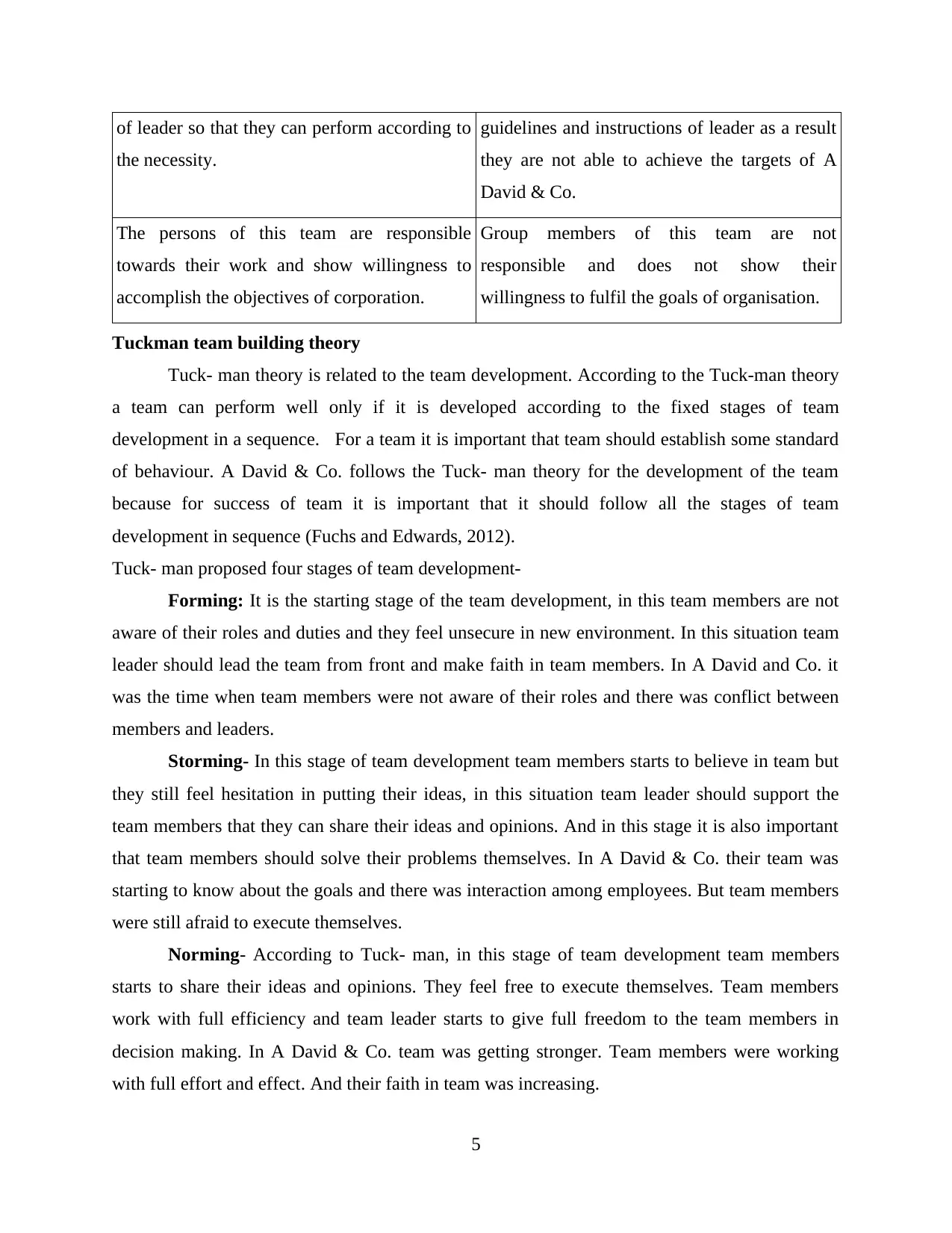
of leader so that they can perform according to
the necessity.
guidelines and instructions of leader as a result
they are not able to achieve the targets of A
David & Co.
The persons of this team are responsible
towards their work and show willingness to
accomplish the objectives of corporation.
Group members of this team are not
responsible and does not show their
willingness to fulfil the goals of organisation.
Tuckman team building theory
Tuck- man theory is related to the team development. According to the Tuck-man theory
a team can perform well only if it is developed according to the fixed stages of team
development in a sequence. For a team it is important that team should establish some standard
of behaviour. A David & Co. follows the Tuck- man theory for the development of the team
because for success of team it is important that it should follow all the stages of team
development in sequence (Fuchs and Edwards, 2012).
Tuck- man proposed four stages of team development-
Forming: It is the starting stage of the team development, in this team members are not
aware of their roles and duties and they feel unsecure in new environment. In this situation team
leader should lead the team from front and make faith in team members. In A David and Co. it
was the time when team members were not aware of their roles and there was conflict between
members and leaders.
Storming- In this stage of team development team members starts to believe in team but
they still feel hesitation in putting their ideas, in this situation team leader should support the
team members that they can share their ideas and opinions. And in this stage it is also important
that team members should solve their problems themselves. In A David & Co. their team was
starting to know about the goals and there was interaction among employees. But team members
were still afraid to execute themselves.
Norming- According to Tuck- man, in this stage of team development team members
starts to share their ideas and opinions. They feel free to execute themselves. Team members
work with full efficiency and team leader starts to give full freedom to the team members in
decision making. In A David & Co. team was getting stronger. Team members were working
with full effort and effect. And their faith in team was increasing.
5
the necessity.
guidelines and instructions of leader as a result
they are not able to achieve the targets of A
David & Co.
The persons of this team are responsible
towards their work and show willingness to
accomplish the objectives of corporation.
Group members of this team are not
responsible and does not show their
willingness to fulfil the goals of organisation.
Tuckman team building theory
Tuck- man theory is related to the team development. According to the Tuck-man theory
a team can perform well only if it is developed according to the fixed stages of team
development in a sequence. For a team it is important that team should establish some standard
of behaviour. A David & Co. follows the Tuck- man theory for the development of the team
because for success of team it is important that it should follow all the stages of team
development in sequence (Fuchs and Edwards, 2012).
Tuck- man proposed four stages of team development-
Forming: It is the starting stage of the team development, in this team members are not
aware of their roles and duties and they feel unsecure in new environment. In this situation team
leader should lead the team from front and make faith in team members. In A David and Co. it
was the time when team members were not aware of their roles and there was conflict between
members and leaders.
Storming- In this stage of team development team members starts to believe in team but
they still feel hesitation in putting their ideas, in this situation team leader should support the
team members that they can share their ideas and opinions. And in this stage it is also important
that team members should solve their problems themselves. In A David & Co. their team was
starting to know about the goals and there was interaction among employees. But team members
were still afraid to execute themselves.
Norming- According to Tuck- man, in this stage of team development team members
starts to share their ideas and opinions. They feel free to execute themselves. Team members
work with full efficiency and team leader starts to give full freedom to the team members in
decision making. In A David & Co. team was getting stronger. Team members were working
with full effort and effect. And their faith in team was increasing.
5
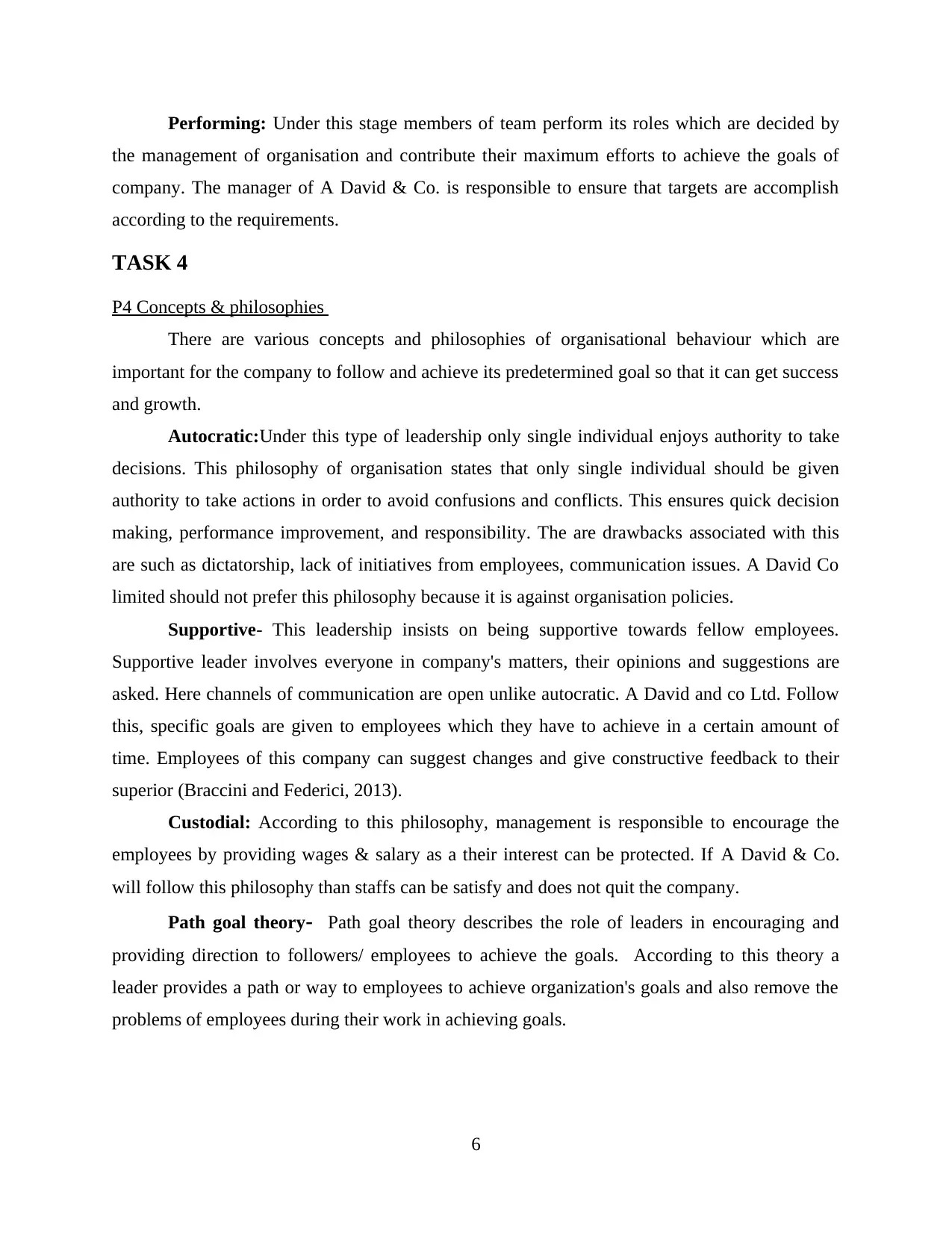
Performing: Under this stage members of team perform its roles which are decided by
the management of organisation and contribute their maximum efforts to achieve the goals of
company. The manager of A David & Co. is responsible to ensure that targets are accomplish
according to the requirements.
TASK 4
P4 Concepts & philosophies
There are various concepts and philosophies of organisational behaviour which are
important for the company to follow and achieve its predetermined goal so that it can get success
and growth.
Autocratic:Under this type of leadership only single individual enjoys authority to take
decisions. This philosophy of organisation states that only single individual should be given
authority to take actions in order to avoid confusions and conflicts. This ensures quick decision
making, performance improvement, and responsibility. The are drawbacks associated with this
are such as dictatorship, lack of initiatives from employees, communication issues. A David Co
limited should not prefer this philosophy because it is against organisation policies.
Supportive- This leadership insists on being supportive towards fellow employees.
Supportive leader involves everyone in company's matters, their opinions and suggestions are
asked. Here channels of communication are open unlike autocratic. A David and co Ltd. Follow
this, specific goals are given to employees which they have to achieve in a certain amount of
time. Employees of this company can suggest changes and give constructive feedback to their
superior (Braccini and Federici, 2013).
Custodial: According to this philosophy, management is responsible to encourage the
employees by providing wages & salary as a their interest can be protected. If A David & Co.
will follow this philosophy than staffs can be satisfy and does not quit the company.
Path goal theory- Path goal theory describes the role of leaders in encouraging and
providing direction to followers/ employees to achieve the goals. According to this theory a
leader provides a path or way to employees to achieve organization's goals and also remove the
problems of employees during their work in achieving goals.
6
the management of organisation and contribute their maximum efforts to achieve the goals of
company. The manager of A David & Co. is responsible to ensure that targets are accomplish
according to the requirements.
TASK 4
P4 Concepts & philosophies
There are various concepts and philosophies of organisational behaviour which are
important for the company to follow and achieve its predetermined goal so that it can get success
and growth.
Autocratic:Under this type of leadership only single individual enjoys authority to take
decisions. This philosophy of organisation states that only single individual should be given
authority to take actions in order to avoid confusions and conflicts. This ensures quick decision
making, performance improvement, and responsibility. The are drawbacks associated with this
are such as dictatorship, lack of initiatives from employees, communication issues. A David Co
limited should not prefer this philosophy because it is against organisation policies.
Supportive- This leadership insists on being supportive towards fellow employees.
Supportive leader involves everyone in company's matters, their opinions and suggestions are
asked. Here channels of communication are open unlike autocratic. A David and co Ltd. Follow
this, specific goals are given to employees which they have to achieve in a certain amount of
time. Employees of this company can suggest changes and give constructive feedback to their
superior (Braccini and Federici, 2013).
Custodial: According to this philosophy, management is responsible to encourage the
employees by providing wages & salary as a their interest can be protected. If A David & Co.
will follow this philosophy than staffs can be satisfy and does not quit the company.
Path goal theory- Path goal theory describes the role of leaders in encouraging and
providing direction to followers/ employees to achieve the goals. According to this theory a
leader provides a path or way to employees to achieve organization's goals and also remove the
problems of employees during their work in achieving goals.
6
⊘ This is a preview!⊘
Do you want full access?
Subscribe today to unlock all pages.

Trusted by 1+ million students worldwide
1 out of 14
Related Documents
Your All-in-One AI-Powered Toolkit for Academic Success.
+13062052269
info@desklib.com
Available 24*7 on WhatsApp / Email
![[object Object]](/_next/static/media/star-bottom.7253800d.svg)
Unlock your academic potential
Copyright © 2020–2026 A2Z Services. All Rights Reserved. Developed and managed by ZUCOL.





